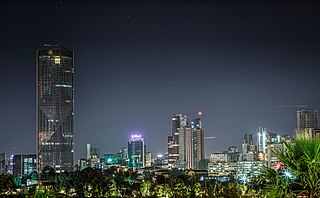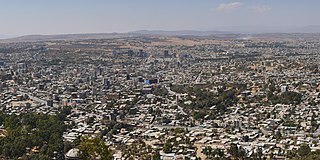
Addis Ababa is the capital and largest city of Ethiopia. In the 2007 census, the city's population was estimated to be 2,739,551 inhabitants. Addis Ababa is a highly developed and important cultural, artistic, financial and administrative centre of Ethiopia. It also serves as the capital of the Oromia Region.

Addis Ababa University (AAU) is a national university located in Addis Ababa, Ethiopia. It is the oldest university in Ethiopia. AAU has thirteen campuses. Twelve of these are situated in Addis Ababa, and one is located in Bishoftu, about 45 kilometres (28 mi) away. AAU has several associated research institutions including the Institute of Ethiopian Studies. The Ministry of Education admits qualified students to AAU based on their score on the Ethiopian University Entrance Examination (EUEE).

The Ethiopia national football team, nicknamed Walia, after the Walia ibex, represents Ethiopia in men's international football and is controlled by the Ethiopian Football Federation, the governing body for football in Ethiopia. The team has been representing Ethiopia in regional, continental, and international competitions since its founding in 1943. The Walias play their home games at Addis Ababa Stadium located in the capital city of Addis Ababa. They are currently ranked 150th in the world according to the FIFA World Rankings and 44th in CAF.

Mekelle, or Mekele, is a special zone and capital of the Tigray Region of Ethiopia. Mekelle was formerly the capital of Enderta awraja in Tigray. It is located around 780 kilometres (480 mi) north of the Ethiopian capital Addis Ababa, with an elevation of 2,254 metres (7,395 ft) above sea level. Administratively, Mekelle is considered a Special Zone, which is divided into seven sub-cities. It is the economic, cultural, and political hub of northern Ethiopia.

The Great Ethiopian Run is an annual 10-kilometre road running event which takes place in late November in Addis Ababa, Ethiopia. With 45,000 participants, the race has become the biggest road race in Africa.

Theodros Teshome Kebede is an Ethiopian filmmaker. Theodros is known for initiating the revival of the Ethiopian film industry in the early 2000s, and for helping to create a boom in film-making in the country. Theodros produces, directs, writes and often acts in his own films, and he has produced films that deal with social issues such as HIV, immigration, and violence against women as well as films with nationalistic content.
The following is a historical events of Addis Ababa, the capital of Ethiopia, including its formation prior to 20th century by chronology.
Sophia Yilma is an Ethiopian journalist and politician. As the first female reporter for the Ethiopian Herald, Sophia was a pioneer in Ethiopian journalism, and rose to occupy important positions in both the Herald and the government. Later, following the Ethiopian Revolution and Civil War, she became a senior leader of the Ethiopian Democratic Party, and is currently its Vice-President.
Yared Zeleke is an Ethiopian film director from Addis Ababa. He has an M.F.A. in Writing and Directing from New York University. His first feature film, Lamb, was screened at the 2015 Cannes Film Festival, Un Certain Regard. It is the first film from Ethiopia to have been officially selected in the festival's 68-year history.
Salem Mekuria is an Ethiopian-born independent filmmaker, video artist and educator living in the United States.
The Skunder Boghossian College of Performing and Visual Arts is the umbrella organization for Ethiopia's oldest secular schools for the arts, offering Bachelors and Masters programs in art, theater, and music.
Bruktawit Getahun, better known by her stage name Betty G, is an Ethiopian singer and songwriter.
Zeresenay Berhane Mehari, is an Ethiopian filmmaker. He is notable as the director of critically acclaimed films Difret and Sweetness in the Belly.
The Gumma Film Awards is an Ethiopian domestic film award held in Addis Ababa annually since 2014. Created by film director Yonas Berhene Mewa, the award programme broadcast through some television stations. Gumma rewards acclaimed domestic Ethiopian films.
Sebastopol Cinema is a movie theatre in Addis Ababa, Ethiopia situated near to Hol-Zee Traditional Restaurant and close to Hall 1, in Arada district. It is owned by Sebastopol Entertainment PLC, which is owned by filmmaker Theodros Teshome. Sebastopol has three screens and executively for Ethiopian films. It is also home of Addis International Film Festival.

The Addis International Film Festival (AIFF) is an Ethiopian annual film festival organized by Initiative Africa and held in Addis Ababa. Established in 2007, the festival showcases experienced or amateur filmmakers candidate from Ethiopia and Africa, and is one of the largest independent documentary cinema festivals in Africa.

The Ethiopian International Film Festival (EIFF) is an Ethiopian film festival that began in 2005 and organized by Linkage Arts Resource Center annually in Addis Ababa. Like to Addis International Film Festival, the EIFF aimed toward Ethiopian and African film industry.

The Commander of the Ethiopian Air Force is the chief and highest-ranking officer of the Ethiopian Air Force The current commander is Lieutenant General Yilma Merdasa.









